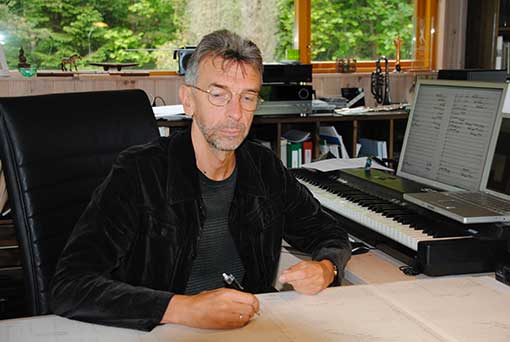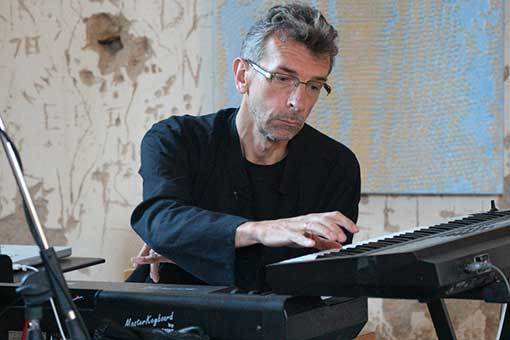He likes solitude in the middle of nature as well as a city atmosphere; he went on the path from a rock band to a symphonic orchestra. The guest of this year’s Moravian Autumn festival is the Estonian composer Erkki-Sven Tüür. When we were arranging the schedule of the telephone interview, we both forgot to take into consideration the different time zones and nearly missed each other. But in the end we found one other - after all everything is connected nowadays, as he too mentioned.
Have you been to the Czech Republic before, or is this your first visit?
I came to the Czech Republic ten years ago for the first time, at that time the Czech Philharmonic played my violin concert. For the second time I was in Brno five years ago, this year will be my third time. Every time I was very pleased and I have very fond memories. I made very good contacts, met incredible musicians and forthcoming people.
In 1980s you led the rock band In Spe, which was very popular in Estonia. What did you play?
I would describe our style as chamber rock. A lot of the music was written in notes, almost nothing was random, and it did not take shape at rehearsals. There was a lot of medieval music influence and rhythmic passages typical of progressive rock. The cast of instruments was also unusual, there were two recorder players, three keyboard players, and then there was a guitar, bass guitar and callisthenics. In the scores we used the option of unusual musical textures - at least regarding rock music. A good example is our Symphony for Seven Performers. For comparison let’s take Mike Oldfield - his long instrumental works - or King Crimson, Genesis, Yes and other similar bands.
Is there any connection between your rock and “classical” compositions?
I think there is. While I was still leading In Spe I invited various guests: a violoncello or a brass quintet. I considered it as my personal development from rock to the composition of chamber and orchestral scores. Looking at music only through one genre would be too limiting for me. My method of composing the rhythmic line in the orchestral percussion section clearly hints that I have experience with rock. But it is not absolutely linear; it is a matter of energy perception within the orchestra. You will clearly recognize it in my Magma symphony, which will also be played at the festival.
What is the source of your compositions, what is the first image: is it sound, colour, harmony, melody or theme ... what is at the beginning?
I must say that this is a very complex question for a brief answer, but I will try. Beginnings are always different and it is difficult to reduce them to one narrowly focused matter. In the beginning there is mostly a great idea of musical drama, or maybe a musical journey, which the new composition must travel. Its components are of course sound colours, timbres and overall intensity, which I would like to achieve. I have a vision, where the music will culminate. Sometimes it is similar to abstract painting; the music form is transferred into visual form. And I proceed from the big general things to details, individual chords, intervals, keys; the composition attains kinetic energy from the melodies of different characters. However, everything comes from one source. It is difficult to describe, because the creation process consists of many layers, which take place at the same time. It takes a long time for me to sit down at a table and to start writing. Before I start creating musical material a lot of things happen on the abstract plane.
One of the concerts of the Moravian Autumn is called Three Estonian Stars: your vocal compositions will be played there along with Aarvo Pärt;Veljo Tormis. Do you consider yourself a star and in what meaning of the word?
No, I don’t consider myself a star and I think that it is not my concern. I don’t need to be connected to a network, which is created by the media or to evaluate my work in this manner.
 What does it mean exactly to be a star in contemporary music, is there such a person?
What does it mean exactly to be a star in contemporary music, is there such a person?
It depends on how you take it. There are groups of people who like contemporary music and for them Pierre Boulez or Karlheinz Stockhausen are absolute stars. And there are others, who admire either Steve Reich or Arvo Pärt and consider them real stars. These two groups hardly agree. Honestly: I had an exciting experience with Arvo Pärt. We went to Paris to perform our compositions, there were world premieres among them and both concerts in the hall for two thousand and five hundred people were sold-out. When Arvo Pärt arrived on stage, the audience was ecstatic. That is the image of a star, fans of his music behave in the same way like fans of rock or pop idols and the line to get his autograph after the concert seemed to be never-ending. However, he is incredibly modest and he does not behave like a star.
Your vocal compositions are written for texts in various languages. To what extent is the original language important, how does it affect the composition as such?
It is very important, syntax, sounds of individual words, rhythm ... language actually dictates a lot. It is a great difference if you set a text to music in your own language or if it is a language which you are a bit distant from. In the second case you feel more freedom. There is yet another difference in case of canonical texts, such as a mass or requiems which have been used for centuries. They are imminently bound to the great composing traditions of all authors who placed the same text in absolutely different musical situations.
When I hear a song in Estonian I do not understand a single word; it sounds like worshipping a magical being or enchanting, the effect is magical. Is it important to understand the vocal part?
I think that there is a deeper layer of understanding, which is hidden in between the words in another dimension. This layer enables us to enjoy a deeper experience. However, I am convinced that music should be so strong that it can move you deeply even without understanding a single word. That is the clear force of the composition, its ability to make a connection which goes beyond human speech.
What is the Estonian music tradition; are there great romantic composers or strong folklore? What do the Estonians consider their national music, who is their national composer?
We have to understand that history of our composers is not as old as the history in Central Europe, but it had a very quick and steep development at the beginning of the 20th century. Our first great composers studied in Petersburg; therefore we are influenced by the famous Petersburg school on the one hand and by the great musical tradition of the Western Europe, where our composers travelled, on the other hand. Our great classics are Rudolf Tobias and Eduard Tubin and their symphonies. We have a great choir tradition, which was shaped by the composers Mart Saar or Cyrillus Kreek. And of course there is Veljo Tormis and Arvo Pärt, who are living legends.
Estonia is a small country with a large and strong neighbour. Is it difficult to retain national identity in such a neighbourhood?
I wouldn’t say it is difficult; on the contrary, the identity is rather strengthened. If you feel threatened, it will make you stronger inside. In the end it is not a matter of identity, but it is a matter of the unstable political situation in the current world. There are many things around us that happen seemingly separate, but in reality they are all connected. The method, which our neighbour uses to manipulate public opinion, what tragedies it caused in the Middle East ... the list would be too long. We live in a very exciting age, the European Union is changing from within, unexpected things are emerging and there is a lot of hypocrisy on the political level around us - that frightens me. It frightens and infuriates me at the same time.
In many countries the law forbids smoking in restaurants. Should music as a background be banned as well, do you like the music?
I don’t like it, but it depends on the situation. I like to go with friends to establishments, where the sound background is created by people talking. And I also like, when the background music is somehow connected to the atmosphere. This is accomplished by jazz, but not the stupid “dum dum” music, which you hear everywhere - I find it unbearable.
 You live on the island of Hiumaa, where you were born - do you prefer the nature or cities?
You live on the island of Hiumaa, where you were born - do you prefer the nature or cities?
Right now I am at my studio, which is surrounded by forest and I can reach the sea in ten minutes- the sound of waves is so calming. When I long for a city, I have a flat in Tallin. I prefer nature, especially when I work on my scores, but it is good to alternate between the two environments. I like extremes - this lonely place surrounded by magnificent nature, as well as really big cities - but cities don’t last long.
Is the island of Hiumaa one extreme and Manhattan is another?
Exactly. These two are perfect places.
This year’s guest is also the Lithuanian composer Justé Janulyté. Two years ago she said that contemporary music survives in closed ghettos. Do you agree with her?
Many composers think that way. If you engage in writing contemporary music, which is then played at very specific festivals, then you get this feeling very easily. But there are also other composers - and I hope that I belong to them - who are active even outside these really closed circles. I don’t think that I would be limited by an imaginary wall, which keeps me in a ghetto. But I understand this feeling very well.
































No comment added yet..